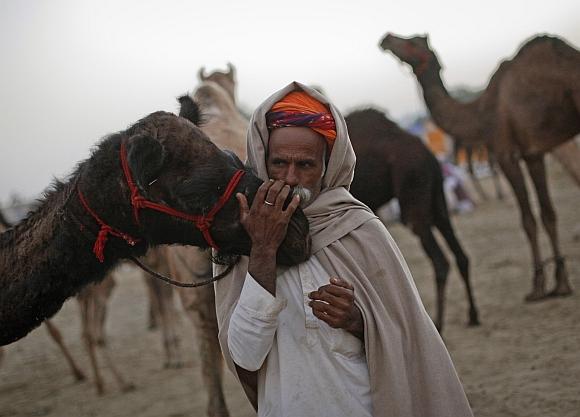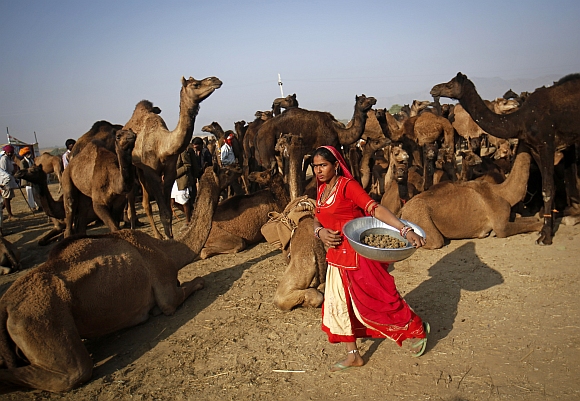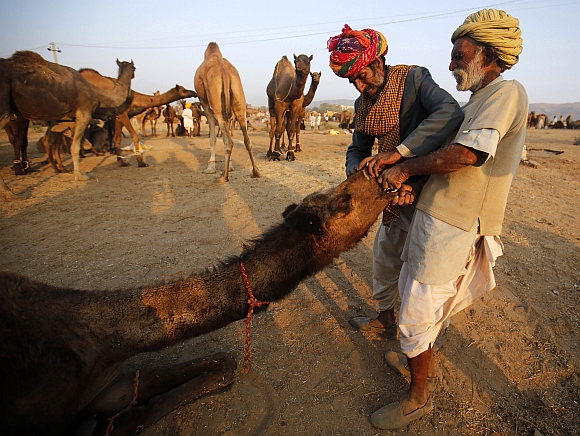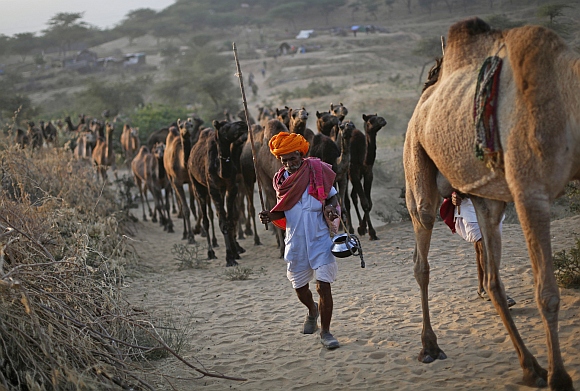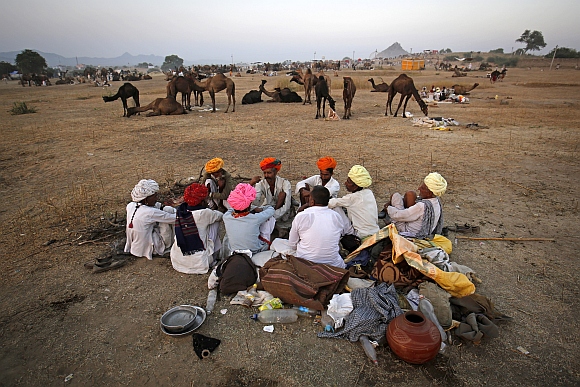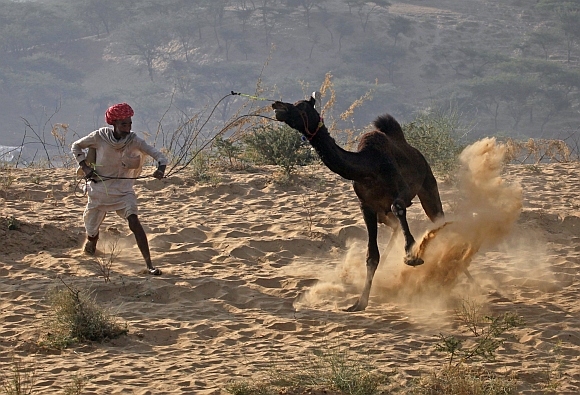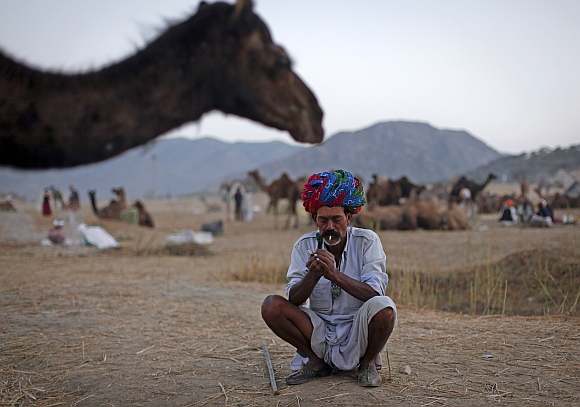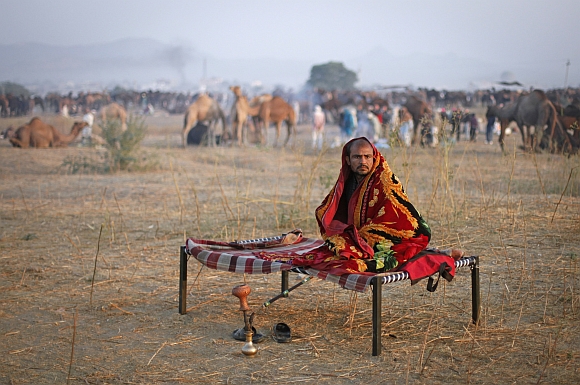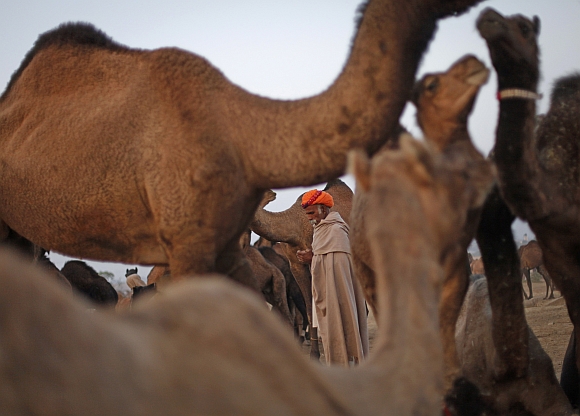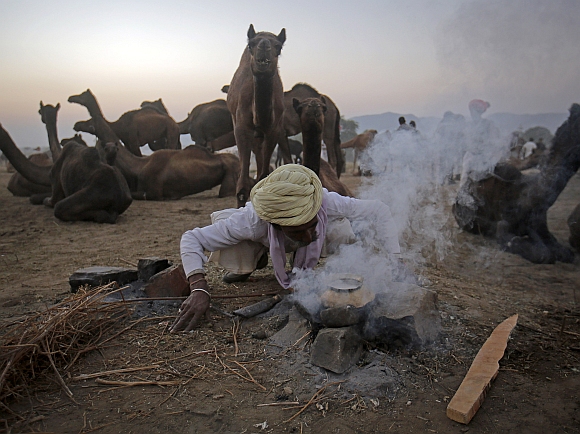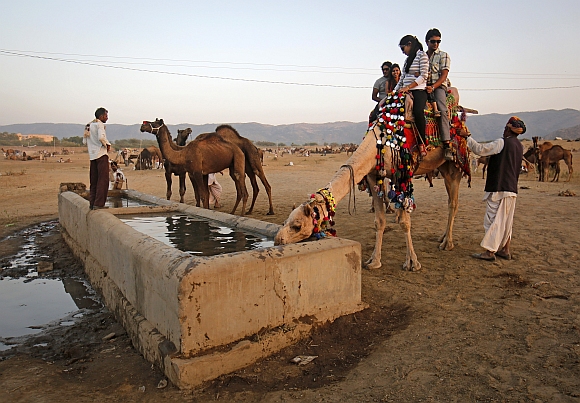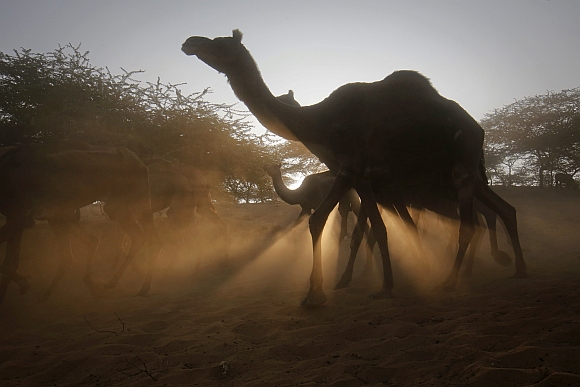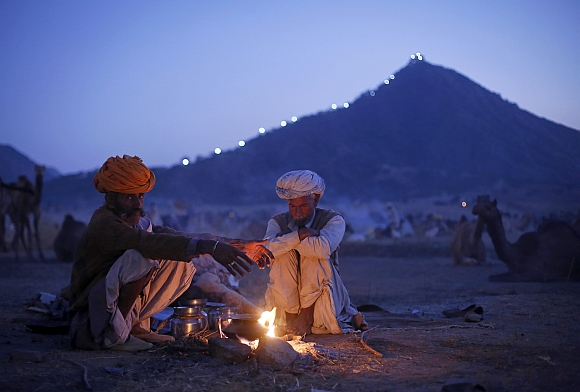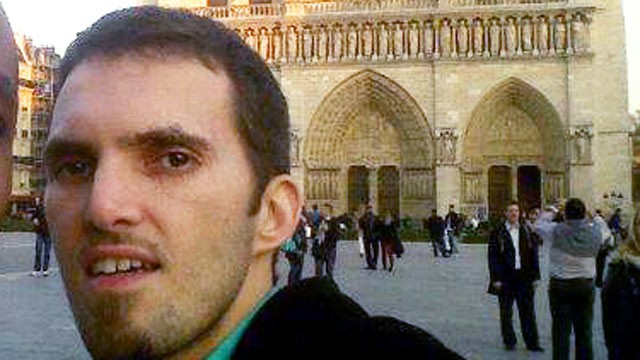الشيخ مدرك بن علي الشيبانيّ ؛ شاعر مطبوع ؛ جزيل اللفظ ، جميل الرمز، قويّ العبارة ، لطيف الإشارة . وقد هام - مع زهدِه وورعِه - بصور الجمال ؛ وأهل الغنج والدلال ! وصار عشق الصورة عنده سبيلاً إلى عشق المطلق !!
وكان تعلّق قلبُه بفتىً مسيحيّ اسمُه عمرو بن يوحنّا ؛ يقال : إنه كان من أحسن فتيانِ زمانهِ خُلُقاً وخَلْقاً !!
وقد قال فيه الشيخ مدرك قصيدته المزدوجة المشهورة في المجاميع الأدبيّة ؛ والتي قيل : إنّها اشتملت على أكثر الطقوس والرموز المسيحيّة ؛ بَلْهَ الأعيادِ الدينيّة ، والرُتبِ الكنسيّة !
كما جاءت القصيدة المثنويّة آية من آيات الغزل والتشبيب ؛ والحبّ العذريّ النجيب ؛ فضلاً عن كونها أُنموذجاً فذّاً للأدب الرفيع ، والشعر الرائق البديع :
فرأَيْتُ من المناسب إثباتها هنا ؛ تذكيراً بها ، وتنويهاً بشأنها ؛ حيث يقول شاعرنا الحِبّ الصَبّ المهيّم الولهان ؛ العفيف الطاهر الجَنان :
مِن عاشِقٍ ناءٍ هَواهُ دانِ ناطِقِ دَمعٍ صامتِ اللِسانِ
مُوثَقِ قلبٍ مُطلَقِ الجُثْمانِ مُعَذَّبٍ بالصَدّ وَالهِجْرانِ
مِن غَيرِ ذَنبٍ كَسَبَت يَداهُ غَيرَ هَوىً نَمّتْ بِهِ عَيناهُ
شَوقاً إِلى رُؤيَةِ مَن أَشْقاهُ كَأَنَّما عافاهُ مَنْ أَضناهُ
يا وَيحَهُ مِن ْ عاشِقٍ مَا يَلقَى مِنْ أَدمُعٍ مُنْهَلَّةٍ مَا تَرقَا
ناطِقةٍ ومَا أَحارتْ نُطْقَا تُخبِرُ عَنْ حِبّ لهُ استَرَقَّا
لمْ يَبْقَ منهُ غَيرُ طَرْفٍ يَبكي بأَدْمُعٍ مثلِ نظامِ السِلْكِ
تُطفيهِ نيرانُ الهَوى وتُذْكِي كأَنَّها قَطْرَ السماءِ تَحْكِي
إلى غَزالٍ مِنْ بَني النَصارَى عِذارُ خَدَّيهِ سَبَى العَذارَى
وغادَرَ الأُسْدَ بِهِ حَيارَى في رِبْقَةِ الحُبّ له أَُسَارَى
رِئْمٌ بدارِ الرُومِ رامَ قَتْلي بِمُقلَةٍ كَحلا ءَ لَا عَنْ كُحْلِ
وطُرَّةٍ بِها استَطارَ عَقْلي وحُسنِ وَجْهٍ وَقَبيحِ فِعلِ
رِئمٌ به أَيُّ هِزَبْرٍ لَم يُصَدْ يَقتُلُ بِاللَحْظِ ولَا يَخشَى القَوَدْ
متَى يَقُلْ (ها) قالتِ الأَلْحَاظُ قَدْ كأَنَّها ناسوتُه حينَ اتَّحَدْ
ما أَبصَرَ الناسُ جَميعاً بَدْرَا ولَا رأَوْا شَمْساً وَغُصْناً نَضْرَا
أَحسَنَ مِنْ عَمروٍ فَدَيْتُ عَمْرَا ظَبْيٌ بعَينَيْهِ سَقاني الخَمْرَا
ها أَنا ذا بِقَدٌهِ مقْدُودُ والدَمْعُ في خَدّي لَهُ أُخْدُودُ
ما ضَرَّ مَنْ فَقْدي بِهِ مَوْجُودُ لوْ لمْ يُقَبّحْ فِعلَهُ الصُدُودُ
إنْ كانَ دِيني عندَهُ الإسلامُ فَقَد سَعَت في نَقضِهِ الآثامُ
واخْتَلّتِ الصَلاةُ والصِيامُ وجازَ في الدِينِ لهُ الحَرامُ
يا لَيْتَنِي كُنْتُ لهُ صَليبَا أََكونُ مِنهُ أَبَداً قَريبَا
أُبصِرُ حُسْناً وَأَشَمُّ طِيبَا لَا واشِياً أَخشى ولَا رَقيبَا
بَلْ لَيْتَنِي كُنْتُ لَهُ قُرْبانَا أَلْثُمُ مِنهُ الثغْرَ والبَنانَا
أَوْ جاثَليقاً كُنْتُ أَوْ مُطُرانَا كَيْما يَرى الطاعَةَ لي إِيمانَا
بَلْ لَيْتَنِي كُنْتُ لِعَمروٍ مُصْحَفَا يَقرأُ مِنّي كُلَّ يَومٍ أَحْرُفَا
أَوْ قَلَماً يَكتُبُ بي مَا أَلّفَا مِنْ أَدَبٍ مُستَحسَنٍ قَدْ صَنّفَا
بَلْ لَيْتََنِي كُنْتُ لِعَمْروٍ عُوْذَهْ أَوْ حُلَّةً يَلبَسُها مَقْذُوذَهْ
أَوْ بَرْكَةً باسمِهِ مأْخُوذَهْ أَوْ بِيْعَةً في دارِهِ مَنبُوذَهْ
بَلْ لَيْتَنِي كُنْتُ لهُ زُنّارَا يُديرُني في الخَصْرِ كيفَ دَارَا
حَتّى إذا اللَيلُ طَوَى النَهارَا صِرْتُ لهُ حينَئِذٍ إزَارَا
قَدْ - والَّذي يُبْقيهِ لي - أَفْناني واِبْتَزَّ عَقلي والضَنى كَسَاني
ظَبْيٌ عَلى البِعادِ والتَداني حَلَّ مَحَلَّ الرُوحِ مِنْ جُثماني
وَاكَبِدي منْ خَدّهِ المُضَرَّجِ وَاكَبِدي منْ ثَغْرِهِ المُفَلَّجِ
لا شَيءَ مثلُ الطَرفِ مِنهُ الأَدْعَجِ أَذهَبُ للنّسْكِ وَللتَّحَرُّجِ
إلَيكَ أَشْكو يا غَزالَ الإنْسِ ما بي من الْوَحْشَةِ بَعدَ الأُنْسِ
يا مَنْ هِلالي وَجْهُهُ وَشَمْسي لا تُقْتَلُ النَفسُ بغَيرِ نَفْسِ
جُدْ لي كما جُدْتَ بحُسْنِ الوُدّ وارْعَ كما أََرْعى قَديمَ العَهدِ
واصدُدْ كَصَدّي عَن طَويلِ الصَدّ فَلَيسَ وَجْدٌ بكَ مثلَ وَجْدي
ها أَنا في بَحرِ الهَوى غَريقُ سَكرانُ مِنْ حُبّكَ لَا أَفيقُ
مُحتَرِقٌ مَا مَسّني حَريقُ يَرثي ليَ العَدوُّ والصَدِيقُ
فلَيْتَ شِعْري فيكَ هَل تَرْثيْ لي من سَقَمٍ بي وَضَنىً طَويلِ
أَمْ هَلْ إلى وصْلِكَ مِن سَبيلِ لِعَاشقٍ ذي جَسَدٍ نَحِيلِ
في كُلّ عُضْوٍ منهُ سُقْمٌ وَأَلَمْ وَمُقلَةٌ تَبكي بِدَمْعٍ وبِدَمْ
شَوْقاً إلى بَدْرٍ وَشَمْسٍ وصَنَمْ منهُ إليهِ المُشتَكَى إذا ظَلَمْ
أَقولُ إذ قامَ بِقَلْبي وَقَعَدْ يا عَمرُو يا عامرَ قَلْبي بالكَمَدْ
أُقسِمُ باللهِ يَمِينَ المُجْتَهِدْ إنّ امْرَأً أَسْعَدْتَهُ لقَدْ سَعِدْ
يا عَمرُو ناشدْتُكَ بالمَسيحِ إلَّا سَمِعْتَ القَوْلَ مِنْ فَصيحِ
يُخْبِرُ عنْ قَلْبٍ لهُ جَريحِ باحَ بِما يَلقَى مِن التَبْريحِ
يا عَمرُو بالحَقّ من اللاهوتِ والرُوحِ رُوحِ القُدْسِ والناسوتِ
ذاكَ الَّذي في مَهْدهِ المَنحوتِ عُوّضَ بالنُطْقِ مِنَ السكوتِ
بِحَقّ ناسوتٍ بِبَطْنِ مَريَمِ حَلَّ مَحَلَّ الريقِ منها في الفَمِ
ثُمَّ استَحال في القُنومِ الأَقْدَمِ فَكَلَّمَ الناسَ ولَمّا يُفْطَمِ
بِحَقّ مَنْ بَعْدَ المَماتِ قُمّصَا ثَوْباً عَلى مِقْدارهِ مَا قُمّصَا
وكانَ للهِ تَقيّاً مُخلِصَا يَشفي وَيُبري أَكْمَهاً وأَبْرَصَا
بِحَقّ مُحيي صورةِ الطُيورِ وباعثِ المَوْتى مِنَ القُبورِ
ومَنْ إليهِ مَرْجعُ الأُمورِ يَعْلمُ مَا في البَرّ والبُحورِ
بِحَقّ مَا في شامِخِ الصوامِعِ مِنْ ساجِدٍ لِرَبّه وراكِعِ
يَبْكي إذا مَا نامَ كُلُّ هاجِعِ خَوْفاً إلى اللهِ بِدَمْعٍ هامِعِ
بِحَقّ قَوْمٍ حَلَّقوا الرُؤوسَا وعالَجوا طُولَ الحَياةِ بُوسَا
وقَرَعوا في البِيعَةِ الناقوسَا مُشمْعِلينَ يَعبُدونَ عيسَى
بِحَقّ مَرْتا مَريَمٍ وَبولُسِ بِحَقّ شَمعونِ الصَفا وبُطْرُسِ
بِحَقّ دانِيَّلْ بِحَقّ يونُسِ بِحَقّ حَزْقِيَّلْ وبَيْتِ المَقْدِسِ
ونينَوى إِذ قامَ يَدعو رَبّهُ مطَهّراً مِنْ كُلِّ سُوءٍ قَلبَهُ
ومُستَقيلاً فَأَقالَ ذَنْبَهُ وَنالَ مِنْ مَوْلاهُ مَا أَحَبّهُ
بِحَقّ مَا في قُلَّة المَيْرُونِ مِنْ نافعِ الأَدْوَاءِ للمَجْنُونِ
بِحَقّ مَا يُؤْثرُ عَنْ شَمْعونِ مِنْ بَركاتِ الخُوصِ والزَيتونِ
بِحَقّ أَعيادِ الصَليبِ الزُهْرِ وعيدِ شَمْعونٍ وَعيدِ الفِطْرِ
وبالشعانينِ الجليلِ القَدْرِ وعيدِ مَرْماري الرفيعِ الذِكْرِ
وعيدِ آشَعْيا وبالهَياكِلِ والدُخَنِ اللاتي بِكَفّ الحامِلِ
يَشْفى بِها مِن خَبْلِ كُلّ خابِلِ وَمِن دَخيلِ السُقْمِ في المَفاصِلِ
بِحَقّ سَبعينَ مِنَ العُبّادِ قاموا بدينِ اللهِ في البِلادِ
وأَرشَدوا الناسَ إلى الرَشادِ حتّى اهتَدَى مَنْ لمْ يَكُنْ بِهادِ
بِحَقّ ثِنْتَي عَشْرَةٍ مِنَ الأُمَمْ ساروا إلى الأَقطارِ يَتْلونَ الحِكَمْ
حتّى إذا صُبْحُ الدُجى جَلّى الظُلَمْ صاروا إلى اللهِ وفازوا بالنِعَمْ
بِحَقّ مَا في مُحكَمِ الإنْجيلِ مِْن مُحكَمِ التَحريمِ والتَحليلِ
وخَبَرٍ ذي نَبإٍ جَليلِ يَرويهِ جِيلٌ قَدْ مَضى عَنْ جِيلِ
بِحَقّ مُرْقُسَ الشَفيقِ الناصِحِ بِحَقّ لُوقَا ذي الفِعالِ الصالِحِ
بِحَقّ يوحَنّا الحَليمِ الراجحِ والشُهَداءِ بالفَلا الصَحاصِحِ
بِحَقّ مَعموديّةِ الأَرْوَاحِ والمَذْبَحِ المَشُهورِ في النَواحي
ومَنْ بِهِ مِنْ لَابسِ الأَمْسَاحِ وَعابِدٍ باكٍ ومِنْ نَوّاحِ
بِحَقّ تَقْريبِكَ في الآحادِ وَشُرْبِكَ القَهْوَةَ كالفِرْصادِ
وطُولِ تَفْتيتِكَ للأَكْبادِ بِما بِعَيْنَيْكَ مِنَ السوادِ
بِحَقّ مَا قَدّسَ شَعْيا فيهِ بالحَمْدِ للهِ وبالتَنْزيهِ
بِحَقّ نِسْطورٍ ومَا يَرْويهِ عَنْ كُلّ ناموسٍ لهُ فَقيهِ
شَيْخانِ كانا مِن شُيوخِ العِلْمِ وبَعْضِ أَرْكانِ التُقَى والحِلْمِ
لَمْ يَنْطِقا قطُّ بِغَيرِ فَهْمِ مَوتُهُما كانا حَياةَ الخَصْمِ
بِحُرْمَة الأُسْقُفِ والمُطْرانِ والجاثَليقِ العالِمِ الرَبّاني
والقُسّ والشَمّاسِ والدَيْراني والبَطرَكِ الأَكْبَرِ والرُهْبانِ
بِحُرمَة المَحبوسِ في أَعْلى الجَبَلْ ومارِقُولَا حينَ صَلّى وابْتَهَلْ
وبالكَنيساتِ القَدِيماتِ الأُوَلْ وبالسَليمِ المُرتَضى بِمَا فَعَلْ
بِحُرمَة الأُسقوفيا والبَيْرَمِ ومَا حَوى مِغفَرُ رأسِ مَرْيَمِ
بِحُرمَة الصَومِ الكَبيرِ الأَعْظَمِ وَحَقّ كُلّ بَركَةٍ وَمَحرَمِ
بِحَقّ يَومِ الدِنْحِ ذي الإِشْراقِ ولَيلَةِ الميلادِ والتَلاقي
والمَذْهَبِ المُذْهِبِ لِلنّفاقِ والفِصْحِ يا مُهَذّبَ الأَخْلاقِ
بِكُلّ قُدّاسٍ عَلى قُدّاسِ قَدّسَهُ القُسُّ مَعَ الشَمّاسِ
وقَرّبوا يَومَ خَميسِ الناسِ وَقَدّموا الكأسَ لِكُلّ حاسِ
إلاَّ رَغِبتَ في رِضا أَديبِ باعَدهُ الحُبُّ عَنِ الحَبيبِ
فذَابَ مِنْ شَوقٍ إلى المُذيبِ أَغْلَى مُناهُ أَيسَرُ التَقريبِ
فاِنظُرْ أَميري في صَلاحِ أَمري مُحتَسِباً فيَّ عَظيمَ الأَجْرِ
مُكتَسِباً فيَّ جَميلَ الشُكْرِ في نَثْرِ أَلفاظٍ ونَظمِ شِعْرِ
اهـ من " ثمرات الأوراق " ( ص : ٣٢٠-٣٢٧ ) لابن حَجّة الحموي .
